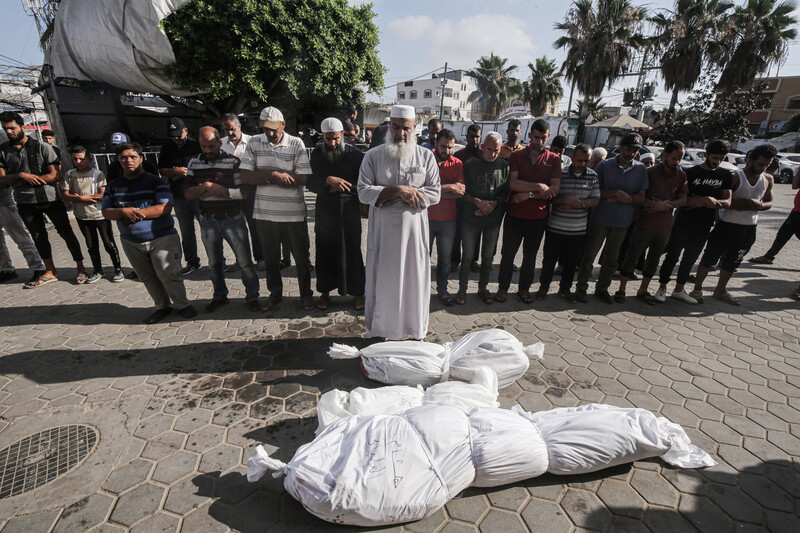The Electronic Intifada 12 June 2024

People attend the funeral prayer at al-Aqsa Martyrs Hospital for Palestinians killed by Israeli airstrikes, 10 June. (Omar Ashtawy / APA Images)
We were at the doctors’ residences when we heard the explosions and shelling. It was Saturday, 9 June, and along with the other doctors I ran to the yard of al-Aqsa Martyrs Hospital without knowing what had happened, what we were about to face.
Since October, I have been volunteering as a doctor to respond to the atrocities inflicted by Israel on Gaza. And this past Saturday was among the worst days I have witnessed.
The Israeli military had attacked Nuseirat refugee camp, martyring at least 274 Palestinians and injuring nearly 700.
Nuseirat is just north of al-Aqsa Martyrs Hospital, which is located in Deir al-Balah, central Gaza, and when we arrived at the hospital, we did not yet know the extent of the massacre, just that we were about to be overwhelmed.
We were surrounded by gunfire and explosions. I thought it was the end.
Suddenly, ambulances rushed in, loaded with dozens of martyrs and wounded. The hospital was soon full of gravely injured people.
I saw people carrying their loved ones, dead, in their arms. We tried to tend to patients as quickly as we could, but most people had to wait in the courtyard for their turn to see a doctor.
We encountered the body of a child who hadn’t even reached the age of 10. I noticed food in his mouth; he didn’t even have time to swallow it. Israel bombed and killed him while he was eating.
The videos and pictures from the hospital shared by journalists only represent a fraction of the horrific scene. Blood was everywhere, screams echoed and the shelling continued. I felt helpless.
I wanted to break down and cry along with the patients, to ask Israel: Are our souls so cheap?
A mother came into the hospital crying, looking for her baby. We went to the martyrs’ tent to search among the bodies for her child. The tent was full of scattered limbs. There was a foot in a box and other things that I cannot bring myself to speak of.
I regret that the mother found her child before we could. Just hearing her scream, I knew she had found him. I couldn’t do anything for her.
A father arrived soon after and handed me the body of his young son. He said goodbye to his son in front of me.
“The last thing I expected was for you to become a martyr,” the father told his son.
We are alone in Gaza. We fight alone.
I turned on the TV later and saw the news report of the Nuseirat massacre.
Over 200 dead, the anchor stated, and then moved on to the next news segment. How meager and small Gaza must seem to the rest of the world.
Is that how we are seen? We’re on the margins of the news bulletin, just numbers.
Shrooq Hijazi is a volunteer doctor in Gaza.





